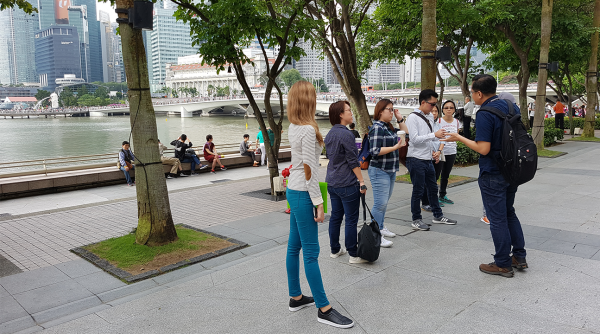SINGAPORE, 18 July 2019: They are usually on first-name terms by the time the tour ends, and it is not uncommon for guides and guests to enjoy long-lasting friendships.
Understandably so, tour guides spend more time with travellers than anyone else in the holiday experience chain, possibly the entire day with clients booked on package tours.
Despite their importance, travel trade conference chatter usually focuses on the perpetual struggle between online travel agencies and hotels, airline connectivity and the tidal swings in tourism policy.

In contrast, tour guides who spend hours every day with travellers are a forgotten touchpoint in the travel experience.
That may have changed last month when the US-born Arival events set up shop in Bangkok. It established the first conference in Asia for attractions, local destination management organisations and your forgotten guides.
It was a bold move built on the successful launch of similar events in the US and earlier this year the first European edition held in Berlin on the sidelines of ITB.
At the inaugural event in Asia, tour guides had their day in the sun at a packed panel discussion led by the Pacific Asia Travel Association CEO Mario Hardy. The dialogue launched with the question, should the tour guide business be deregulated? He didn’t get a definitive answer from either the audience or the panel that represented Thailand, Singapore, Mekong Region countries and Taiwan.
But that was understandable. Possibly the consensus favoured leaving things unresolved. Why upset the apple cart? Guides have been around since the first Thomas Cook tour departed 177 years ago.
However, tour guides looking for change gained some cheer from the Singapore Tourist Board’s Jeanie Lim response. She reported the city-state eased its strict legislation on guides in January 2018. A review of the law scrapped the registration process for guides who offer a service such as walking, cycling and kayaking tours that do not require conventional transport. It saves them at least SGD1,000 in registration fees
According to STB: “These entities pose a low risk to consumers as prepayment is typically small or not required.
“The intent is to allow a select group of entities that pose lower consumer risk to enter the market more easily, so as to encourage the emergence of more differentiated and innovative offerings to tourists and locals.”
Here, was an example of a change in direction in ASEAN, a region where some of the strictest rules apply for guides and travel agents.
Tour guides across the region, while probably opposing outright deregulation would welcome a rethink of legislation if it cut the time-consuming and expensive registration process.
Many of the regulations established back in the 1970s should be made more compatible with the digital era and the demands of travellers for a more immersive experience. A different genre of guides should emerge that has different skill sets than those required under present regulations.
While Singapore says, it eased the rules, Tourism Authority of Thailand’s deputy governor Siripakorn Cheawsmoot talked of recruiting “Good Hosts.”
First identified in 2017, TAT recruited and trained “Good Hosts” to counter negative perceptions that Thailand’s legendary hospitality had fallen on hard times.
The campaign focused on the message that local communities could act as “hospitality ambassadors” and with the assignment, they became in all but the name incognito guides. The Good Hosts programme recruited local community leaders and retired government officials, who could be counted on to tell a good news story to visitors.
Siripakorn told the Arival audience “Good Hosts” gave travellers a choice.
“Not exactly registered guides, they give tourists a choice… they can either choose a registered guide or when appropriate a Good Host,” he explained.
But Good Hosts don’t resolve language challenges. A tour operator identified the critical shortfall in Russian, Chinese and Turkish speaking Thai guides. Predictably his wishlist included a change in the law to “allow foreigners to fill the gap when there is a shortage of Thai guides.
Outside of the package tour market, the role of the traditional tour guide is diminishing fast. Today, city guide apps deliver an accurate narrative in the user’s language that links to a mobile phone’s location function.
Although limited to historical details and information on dining and shopping options, the apps are already disrupting the world of the tradition guide in the manner that ride-hailing services cut into the taxi business.
As talk of deregulation takes hold, it could lead to new guide categories. They might tap the vast pool of “local experts” retired professionals and teachers who have skills and knowledge that would enhance travel experiences.
The guiding story is not over. Thanks to Arival it gained an airing at the inaugural event. Hopefully, it will inspire governments to redefine the role of tour guides in the context of the digital era, while engaging local wisdom a fantastic untapped asset.






